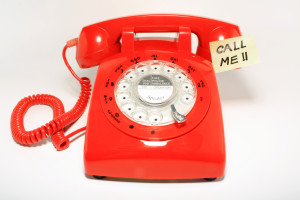"How do I get a debt collector to stop harassing me at work?"
When a collector is harassing you at work, you may wonder, “How do I get them to stop?”
There are two options when you’re dealing with harassment.
Ask them to stop calling you at work.
Let’s assume that they aren’t talking to your coworkers, yelling at you, or cussing you out.
They’re actually being respectful to you.
The fact of the matter is that most employers ask that you don’t handle personal business at work.
With these collectors, you can call them (or answer their call) and let them know that they can’t call you at work. The honorable ones will apologize and take your work number off of your list.
Once you’ve called them back to ask them not to call you at work, you’ll know whether or not you’re dealing with an honorable or dishonorable debt collector.
If they’re an honest collector, they say, “Oh, we understand. We’re putting this in our notes, flagging that number, and we won’t be calling you at work ever again.”
If they do this, then they’re following the law.
What if they continue calling you after you asked them to stop?
Well, then you know that you’re dealing with a dishonest debt collector that doesn’t mind breaking the law.
If a debt collector continues calling you after you’ve asked them to stop, you can sue them in Federal Court.
You can use the FDCPA, or Fair Debt Collection Practices Act, to sue these dishonorable debt collectors.
This law governs debt collectors.
We have other articles about when it applies, but for now let’s assume that it does apply.
Under this law, you can sue them for money damages.
Ironically, these debt collectors will come into court and complain about how unfair it is that you’re suing them.
The judge will be surprised, because the law says the collectors can’t call after you tell them you are not allowed to get these calls. But the collector continued to call you. Seems pretty simple, right?
When the debt collector is asked about this, they tend to say, “Well, they did ask us to stop, but they’re at work for 8 hours. It really works for us to call them 4 times a day when they’re at work.”
The law states that if a collector calls you after you’ve revoked permission to call, they’re breaking the law.
What if they’re calling and asking my coworkers about my job and telling them that I need to call them back?
If they’re calling and asking your coworkers questions such as, “How long has she been working there?” and, “How much money does he make at this job?” then that is simply harassment.
They’re calling coworkers, supervisors and Human Resource managers to try and get to you.
In business this is referred to as an “office party.” You can read more about this dirty trick of debt collectors here.
This is when they call all of these people in your office, so that your coworkers come up to you and say, “Hey, you need to call this number back.”
Unfortunately, you know that number is the debt collector.
Then your boss says, “I’m getting these strange calls from this number about you.”
On top of that, Human Resources contacts you and says, “We’ve been getting these weird faxes asking about how much you make here at your job.”
It gets to the point that you just pay them to stop bothering you.
You may not owe them any money, but they’ve been harassing you so much that you just want them off of your back.
Sue them under the FDCPA in Federal Court for all the calls that they have made to you and your co-workers.
When you do this, they see it as a punishment for breaking the law.
One day, once they’ve been sued enough, they’ll wonder, “Is this money really worth breaking the law?”
It may take more than one lawsuit for them to change, but your lawsuit will help bring about this change.
Each case against them gets them closer to considering following the law.
You have two options when you’re being harassed by a debt collector at work.
You can ask them to stop calling you at work.
If they don’t stop calling or if they are already calling coworkers, you can sue them in Federal Court under the FDCPA.
Feel free to contact us.
If you live in Alabama, and you have any questions about what to do with the collector calling your work, what you get out of suing them, or how it stops them, you can call us at 1-205-879-2447.
You can also fill out a contact form and we will happily get in touch with you.
I look forward to chatting with you!
Have a great day.
